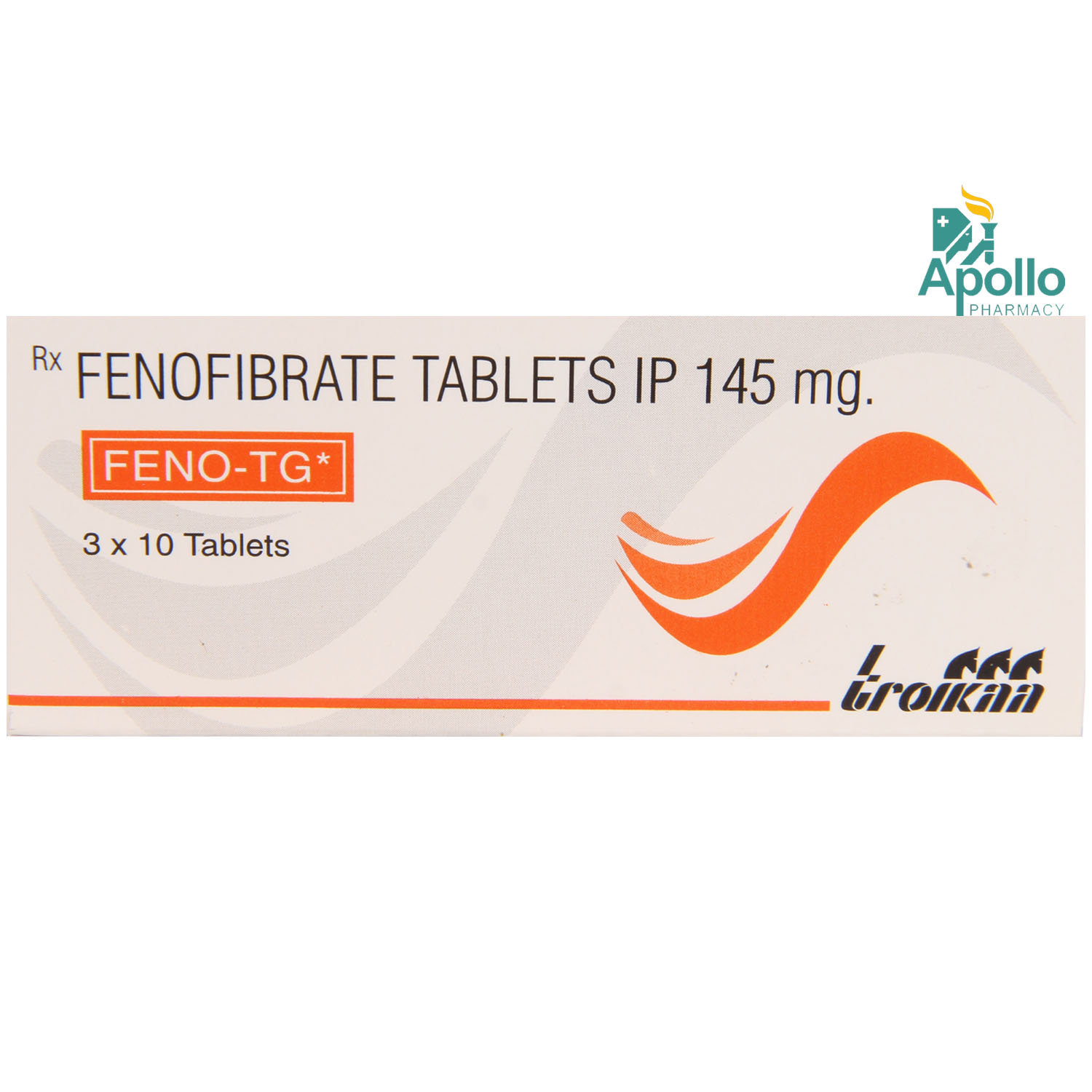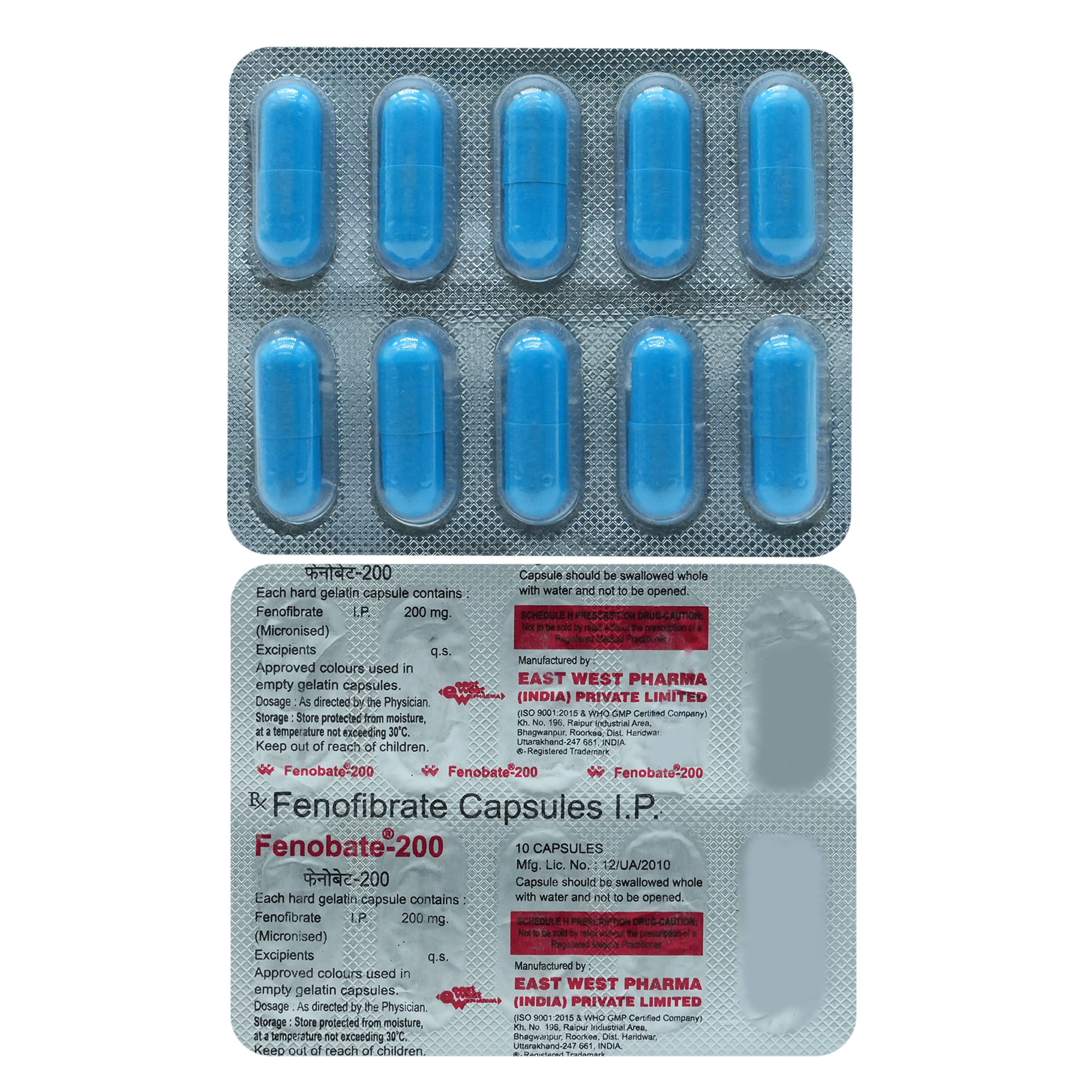Fenofibrate
About Fenofibrate
Fenofibrate belongs to a group of medications called 'fibric acid derivatives or 'fibrates' primarily used to treat raised or increased cholesterol levels or fat/oils. Hyperlipidemia is a condition in which there is a high level of low-density lipoproteins (LDL) or bad cholesterol and a decreased level of high-density lipoprotein (HDL) or good cholesterol. Increased level of bad cholesterol leads to a high risk of heart attack and stroke in future, especially for heart disease patients.
Fenofibrate contains 'fenofibrate', which works by increasing the natural substance that breaks down fats in the bloodstream, thereby increasing its utilization and removal. As a result, Fenofibrate decreases harmful cholesterol like LDL (bad cholesterol) triglycerides (TG) and increases levels of HDL (good cholesterol).
Always take the Fenofibrate exactly as prescribed by your doctor. Some people may experience nausea, chest pain, vomiting, diarrhoea, drowsiness, muscle pain, redness/swelling in the legs and increased liver enzymes. Most of these side effects of Fenofibrate do not require medical attention and gradually resolve over time. However, if the side effects persist or worsen, please consult your doctor.
To treat your condition effectually, continue using Fenofibrate for as long as your doctor has prescribed it. Do not use Fenofibrate without a doctor's advice if you have a skin reaction or irritation to any medicine. Consult your doctor before using Fenofibrate if you are pregnant or breastfeeding. Fenofibrate is not recommended for children under the age of 18, as the safety and effectiveness were not established. Avoiding alcohol is recommended to rule out any possibility of side effects.
Uses of Fenofibrate
Medicinal Benefits
Fenofibrate contains 'fenofibrate', which is used along with a proper diet to help lower 'bad cholesterol' (LDL, TG -triglycerides) and raise 'good cholesterol' (HDL) in the blood. Fenofibrate is also used with statins to lower raised cholesterol. Besides this, Fenofibrate also helps in the treatment of raised cholesterol in diabetes and high blood pressure patients as well.
Directions for Use
Storage
Side Effects of Fenofibrate
- Muscle pain
- Stuffy/runny nose
- Headache
- Joint pain
- Increased liver enzymes
Drug Warnings
Before taking the Fenofibrate, let your doctor know about all your allergic or hypersensitivity reactions to medicines or food. Inform your doctor if you are suffering from bladder problems, gallstones, liver disease, kidney disease, or muscle problems (like muscle pain, myopathy, or rhabdomyolysis). If you are pregnant or breastfeeding, please tell your doctor so that your doctor will weigh the benefits and any potential risks before prescribing it to you. Keep your doctor informed about your health condition and all the medicines you are taking before taking Fenofibrate to rule out any side effects. Avoiding alcohol is recommended to rule out any possibility of side effects like dizziness. Fenofibrate is not recommended in children below 18 years of age.
Drug Interactions
Drug-Drug interactions: Fenofibrate interacts with oral anticoagulants (coumarin, warfarin), anti-gout medicines (colchicine), and other fibrates (clofibrate, gemfibrozil, ezetimibe).
Drug-Food interactions: Avoid food containing too much fat.
Drug-Disease interactions: Fenofibrate should be used with caution in patients with liver problems, gall bladder stones, bladder disease, pancreatitis (inflammation of the pancreas), and muscle problems (myasthenia gravis, rhabdomyolysis).
Drug-Drug Interactions Checker List:
Safety Advice

Alcohol
cautionAvoid drinking alcohol as it can raise liver enzymes and liver functions test (LFT), thereby damaging your liver.

Pregnancy
cautionFenofibrate is a Category C risk medicine; talk with your doctor if you’re pregnant or planning to become pregnant. Fenofibrate should be used only if the potential benefit justifies the potential risk.

Breast Feeding
unsafeFenofibrate should not be used in nursing mothers unless clearly necessary. So, inform your doctor if you are a nursing mother. Your doctor will weigh the benefits and potential risks before prescribing Fenofibrate.

Driving
safe if prescribedFenofibrate does not impact your ability to drive or operate machinery.

Liver
cautionCaution is advised. If you have/had liver problems, your doctor may need to monitor your liver function.

Kidney
cautionFenofibrate should not be used in severe kidney problems, including in patients on dialysis. However, mild to moderate kidney patients can use Fenofibrate if prescribed by the doctor.

Children
cautionFenofibrate is not recommended for children under the age of 18.
Habit Forming
Diet & Lifestyle Advise
- Eating a proper diet (such as a low-cholesterol/low-fat diet) and other lifestyle changes that may help this medication work better include exercising, losing weight if overweight and stopping smoking.
- It is best to limit or avoid alcoholic drinks while you are taking this medicine.
- Using this medicine with alcohol can lead to additive side effects such as increased drowsiness. Do not drive or operate machinery if you are drinking alcohol-containing beverages.
- Contact your healthcare provider immediately if you notice slurred speech, confusion, severe weakness or difficulty breathing.
Special Advise
- Cholelithiasis can occur with the use of Fenofibrate, so discontinue if any gallstones are detected.
- Breast-feeding is not recommended while using this drug and for five days after stopping the medication. Consult your doctor before breastfeeding.
- If you are already taking any blood thinner, regular monitoring of bleeding time should be done.
- Regular liver function tests (LFT) and kidney function tests (KFT) are suggested if you are taking Fenofibrate for a prolonged time.
Patients Concern
Disease/Condition Glossary
Hyperlipidemia/High cholesterol: When the concentration of cholesterol (like lipids/oil/fats) in your blood is too high, this condition is called hyperlipidemia. Lipids are made naturally in our bodies and also taken from external foods. The liver breaks down these fats for further use. If the levels of lipids are too high, the excess fat is deposited onto the walls of the heart's blood vessels of the heart, which can lead to plaque formation within the lining of arteries, leading to clogged arteries. These clogged arteries can increase the risk of stroke and heart attack.
FAQs
Fenofibrate contains 'fenofibrate', which works by increasing the natural substance that breaks down fats in the bloodstream, thereby increasing its utilization and removal. As a result, Fenofibrate decreases harmful cholesterol like LDL (bad cholesterol) and triglycerides (TG) and increases levels of HDL (good cholesterol).
You should not take Fenofibrate if you are allergic to fibric acid derivative or Fenofibrate, have a severe renal impairment (including dialysis patient), have active liver disease, gallbladder disease (gallstone) or are a nursing mother.
Increased liver enzymes (like liver function tests - LFTs), rhinitis, stuffy/runny nose, nausea, indigestion, headache and back pain are some common side effects that may occur in some cases.
No, Fenofibrate does not reduce the risk of having heart problems in patients with type 2 diabetes.
Long-term complications of Fenofibrate are muscle problems (like unexplained muscle pain) and liver problems (with increased liver enzymes). So, if you experience these symptoms, please consult a doctor.
Fenofibrate raises the risk of muscle pain and a serious muscle problem called rhabdomyolysis. The risk is higher if you take the drug along with statins.
It is completely fine to use oral contraceptives with Fenofibrate as no such interactions have been found. Consult your doctor for further advice.








